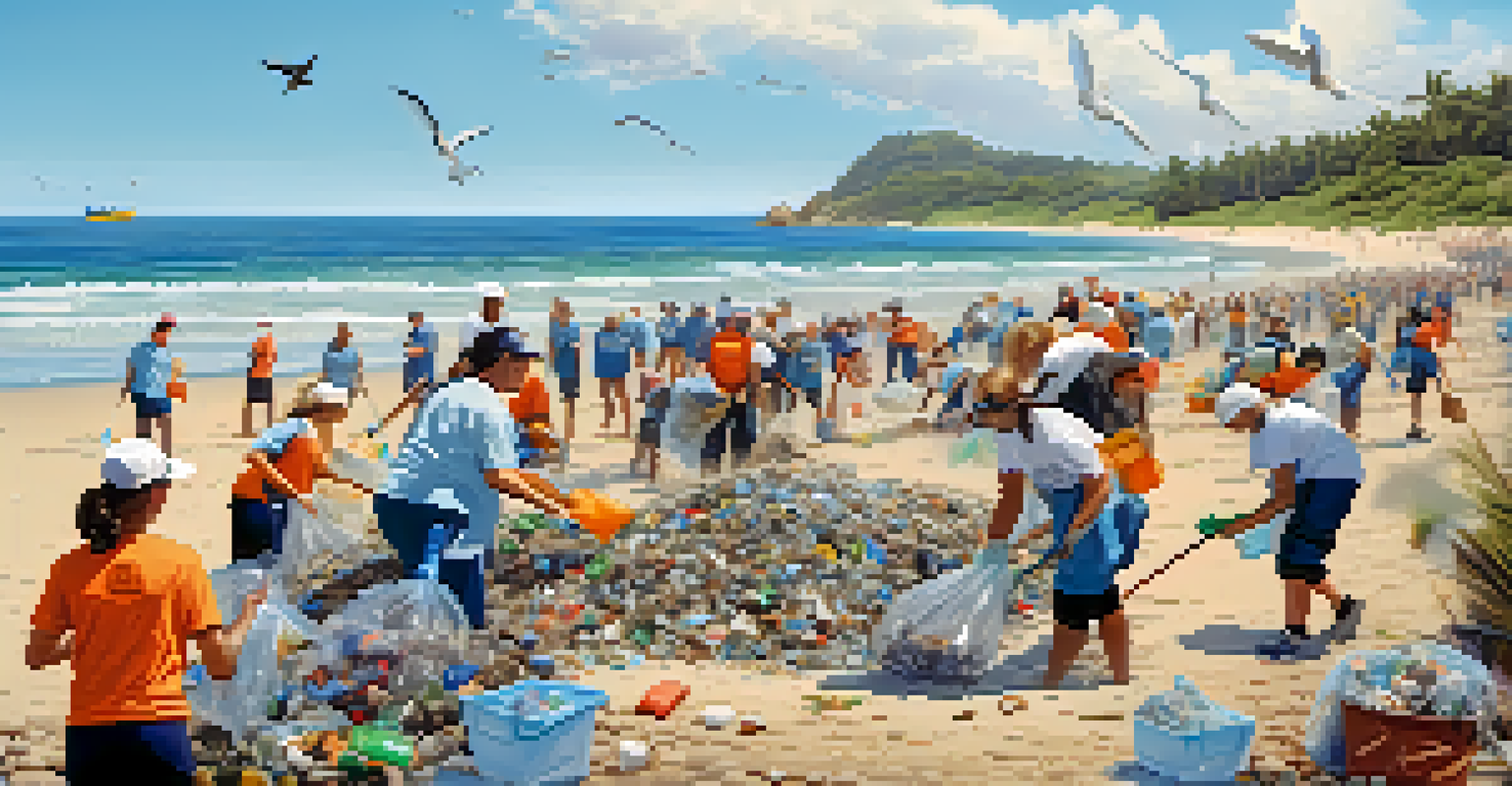Reducing Plastic Waste: A Guide to Healthier Living

Understanding Plastic Waste and Its Impact
Plastic waste is a growing concern in our modern world, affecting not just the environment but our health too. Every year, millions of tons of plastic end up in landfills and oceans, taking centuries to decompose. This accumulation not only harms wildlife but also poses risks to human health through toxins that can leach into food and water sources.
We won’t have a society if we destroy the environment.
By understanding the problem, we empower ourselves to make informed choices. The average person uses about 167 plastic water bottles a year, which can seem overwhelming. However, recognizing the extent of plastic usage is the first step toward reducing it in our daily lives.
Taking action against plastic waste helps foster a healthier environment and community. Small changes can lead to significant impacts, so let’s explore practical steps we can take to reduce our plastic footprint.
Choosing Reusable Alternatives
One of the most effective ways to cut down on plastic is by switching to reusable alternatives. For instance, carrying a reusable water bottle instead of buying bottled water can save hundreds of plastic bottles each year. Similarly, opting for cloth bags over plastic ones while shopping makes a substantial difference.

These alternatives not only help reduce plastic waste but often save money in the long run. Reusable items are typically more durable, meaning they can withstand the test of time, unlike single-use plastics that need constant replacement. Plus, many reusable products come in stylish designs, making eco-friendliness a fashionable choice.
Reduce Plastic with Reusables
Switching to reusable products like water bottles and cloth bags can significantly decrease plastic waste.
When you choose reusables, you're not just making a personal choice; you're inspiring others to follow suit. Sharing your experiences with friends and family can create a ripple effect, encouraging a community-wide commitment to reducing plastic waste.
Shopping Smart: Avoiding Plastic Packaging
Shopping smartly can significantly impact the amount of plastic we bring home. Start by choosing bulk bins or local farmers’ markets where items are often sold without plastic packaging. Not only does this reduce plastic waste, but it also supports local economies and provides fresher produce.
The greatest threat to our planet is the belief that someone else will save it.
When grocery shopping, look for products packaged in glass, cardboard, or metal instead of plastic. For instance, opting for glass jars for sauces or metal cans for beverages can help you avoid plastic entirely. Additionally, consider bringing your own containers for deli items or baked goods to further minimize waste.
Planning your shopping trips and making a list can also help avoid impulse buys that often come in plastic packaging. By being mindful of your purchases, you can develop a more sustainable shopping habit that aligns with your goal of reducing plastic waste.
DIY Solutions to Reduce Plastic Use
Creating your own products at home can be a fun and eco-friendly way to reduce plastic. For example, instead of buying plastic wrap, try using beeswax wraps or simply cover bowls with cloth. DIY cleaning solutions can also help eliminate the need for plastic bottles, as you can mix natural ingredients like vinegar and baking soda.
Many people enjoy making their own beauty products, like scrubs or moisturizers, using simple, natural ingredients. This not only reduces plastic waste from store-bought items but also allows you to know exactly what you’re putting on your skin. Plus, it can be a great way to personalize your products to suit your preferences.
Support Sustainable Companies
Choosing to buy from companies that prioritize eco-friendly practices helps promote a healthier environment.
Embracing DIY solutions is not just about reducing plastic; it’s also about sustainability and creativity. Sharing your homemade creations with friends can foster a sense of community and encourage others to join in on the plastic reduction journey.
Educating Yourself and Others
Education is key in the fight against plastic waste. By learning more about the impact of plastic on the environment and health, you can make better choices and share that knowledge with others. Many resources, including documentaries and books, can provide valuable insights into the plastic crisis.
Discussing the issue with friends, family, or community groups can raise awareness and spark meaningful conversations. Hosting workshops or informational sessions can help others understand the importance of reducing plastic waste and how they can contribute. Remember, change often starts with a single conversation.
As you educate yourself, consider following organizations dedicated to reducing plastic consumption. They often share tips, resources, and initiatives that you can participate in, allowing for a more connected and informed community effort to tackle plastic waste.
Supporting Companies with Sustainable Practices
One impactful way to reduce plastic waste is by supporting companies that prioritize sustainability. Look for brands that use eco-friendly packaging or have programs in place for recycling their products. By choosing to buy from these companies, you send a message that consumers value environmentally conscious practices.
You might also consider switching to brands that offer refill stations for their products, such as shampoos or cleaning supplies. This not only helps cut down on plastic packaging but also encourages a circular economy, where products are reused rather than discarded. Every purchase is a vote for the kind of world you want to live in.
Advocate for Plastic Policy Change
Engaging in advocacy efforts can lead to meaningful policy changes that reduce plastic consumption in communities.
Engaging with these companies on social media can amplify your voice, encouraging more businesses to adopt sustainable practices. Together, consumer choices can lead to significant changes in the market, creating a ripple effect that promotes a healthier planet.
Advocating for Policy Changes
Advocacy is a powerful tool in the quest to reduce plastic waste. Engaging with local government and supporting policies that limit single-use plastics can lead to meaningful change. Many cities and countries are already implementing bans on plastic bags or straws, demonstrating that collective action can drive progress.
By participating in community clean-ups or awareness campaigns, you can help raise the profile of plastic pollution and motivate others to get involved. Your voice matters, and sharing your concerns with policymakers can help shape laws that protect the environment and public health.

Joining or supporting environmental organizations focused on reducing plastic waste can also amplify your efforts. These organizations often have the resources to lobby for change and can provide you with tools to make your advocacy more effective.